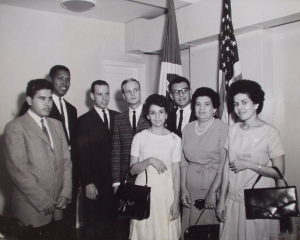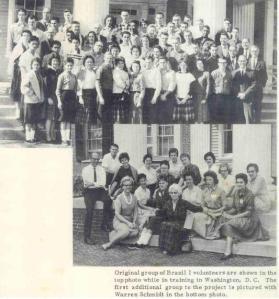| This content have been created and organized by Juan E. Rosario a Returned Peace Corps Volunteer (RPCV) from the first project to Brazil from January 1962 to December 1963. The Brazil I Peace Corp Project was administer by The National 4-H Center, Chevy Chase, MD, The Associação Brasileira de Credito e Assistência Rural (ABCAR) and the Agriculture Extension Service of every state served. Our project was responsible to provide support to the work of the Brazilian Agriculture Extension Service personnel with the 4-S Clubs. Those clubs, similar the our 4-H Clubs, were integrated by young and adolescent children of the rural communities of the regions served by the Agriculture Extension Service of each state. For comments or suggestions write to: brazilone6263@gmail.com |
We  would like Ito encourage all RPCVs from the Brazil I Project, MOBs, Replacement group or anyone who served in this country to use this blog to share their thoughts, comments or suggestions for this event or any other. You only need to click on any Comments link to get access to the writing pad.
would like Ito encourage all RPCVs from the Brazil I Project, MOBs, Replacement group or anyone who served in this country to use this blog to share their thoughts, comments or suggestions for this event or any other. You only need to click on any Comments link to get access to the writing pad.
Your participation will be public. For private messages, please use our email: jerosario722041@aol.com.
Sharing your photos - if you have photos from your work in Brazil and want to share them, please send them to our email address. Please include the accompanying information to each one.






































